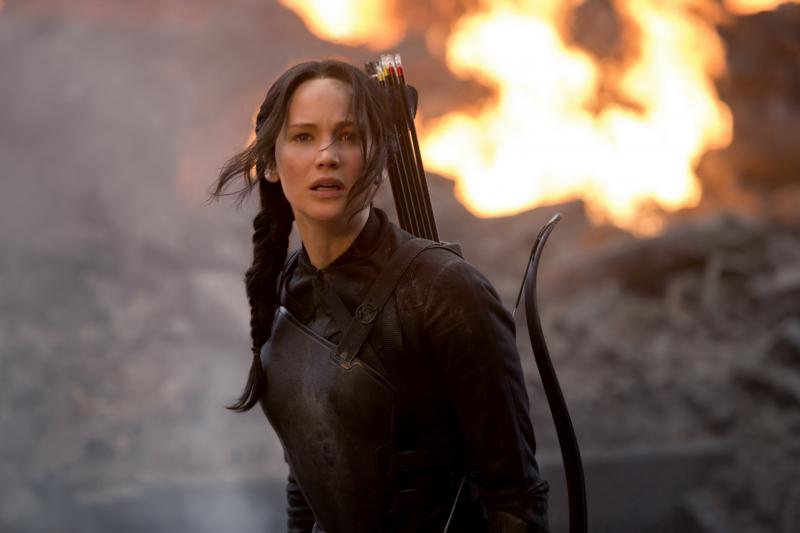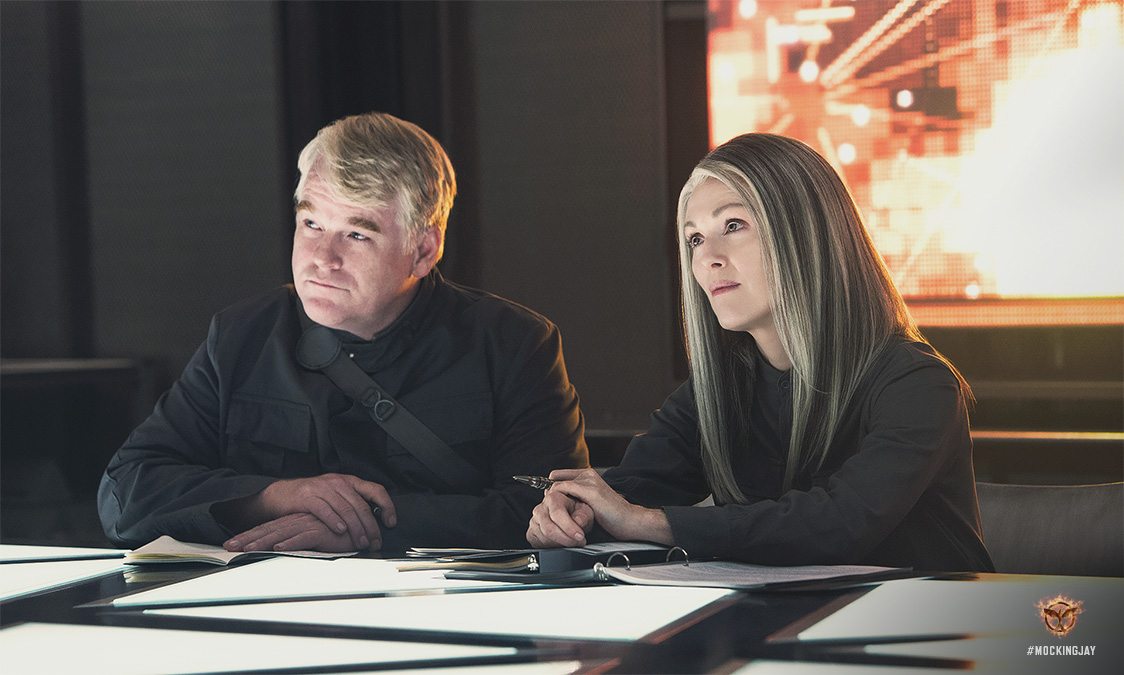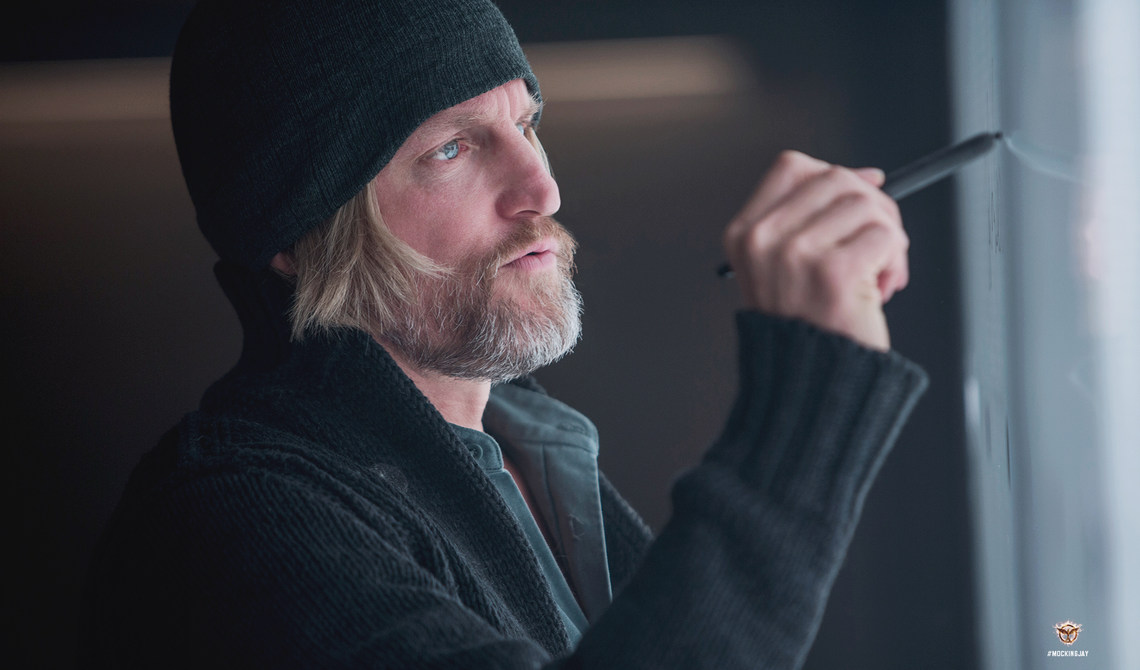The Hunger Games: Mockingjay - Part One | reviews, news & interviews
The Hunger Games: Mockingjay - Part One
The Hunger Games: Mockingjay - Part One
Jennifer Lawrence returns in the series' best and most nuanced instalment to date

Fortune, as a rule, does not favour Part Threes. Hollywood history is replete with sequels that outstrip their predecessors, but second sequels have an altogether patchier track record – for every Return of the King, there are five Spider-Man 3s.
The Hunger Games’s third instalment has a lot of things stacked against it, from the cynical bifurcation of an already slow-paced story into two parts, to the fact that Mockingjay is by far the least loved of Suzanne Collins’ novel trilogy. It’s a prickly, bleak war story with no actual Hunger Games to speak of, its once gutsy heroine Katniss (Jennifer Lawrence) transformed into a passive pawn by political forces beyond her control. So how is it that Mockingjay: Part One emerges as the best Hunger Games film so far by such a wide margin?
 The key lies in new screenwriters Peter Craig and Danny Strong, who understand the value of the unspoken. The romantic angst between Katniss and her two suitors Peeta (Josh Hutcherson) and Gale (Liam Hemsworth) is by far the least compelling aspect of the series, and last year’s Catching Fire became hopelessly bogged down in melodramatic exchanges that did Lawrence a disservice.
The key lies in new screenwriters Peter Craig and Danny Strong, who understand the value of the unspoken. The romantic angst between Katniss and her two suitors Peeta (Josh Hutcherson) and Gale (Liam Hemsworth) is by far the least compelling aspect of the series, and last year’s Catching Fire became hopelessly bogged down in melodramatic exchanges that did Lawrence a disservice.
Here everyone’s too hollowed-out to do much talking, with a traumatised Katniss adjusting to life in the underground District 13 after her home district was gutted by the despotic President Snow (Donald Sutherland). So instead of one more anguished conversation about why Katniss can’t love Gale, we get her silently laying her head against his shoulder after they hunt, a moment that works because it’s about everything they’re not saying.
A far more pivotal scene pivots on Katniss singing "The Hanging Tree", a haunting ditty taken straight from Collins’ prose and reimagined by The Lumineers. It’s a breathlessly evocative sequence that is hard to imagine existing in any other young adult franchise, speaking to the sense of doom that pervades Mockingjay. Ostensibly, things are looking up – having spent two films at the mercy of Snow and his dystopian government, Katniss now finds herself within an enclave of rebels led by President Coin (a slippery Julianne Moore) and Plutarch Heavensbee (Philip Seymour Hoffman).
In no other current series are the stakes so high, the pain so immediate, or the characters so lovingly drawn
With her “electrifying” act of defiance at the end of Catching Fire’s Quarter Quell, Katniss has stirred the beginnings of a revolution across Panem, and Coin is keen to channel that influence by filming a series of propaganda clips centred on Katniss delivering inspirational rhetoric. But Katniss is barely stable, prone to swing wildly between hysteria and catatonia, and distressed further by the revelation that Peeta is not dead, but rather is being trotted out as a political puppet on the Capitol’s chat show.
Lawrence has seldom been more compelling as she plumbs both Katniss’s vulnerability and her reluctant strength, and the "propo" device embodies what is both so strange and so strikingly effective about Mockingjay: Part One’s structure. Every significant plot turn and character decision takes place on a screen within a screen, delivered as spin or as subterfuge – Katniss’s "If we burn, you burn with us" speech, a game-changing twist from Peeta, a face-off between Snow and Katniss, some dark exposition for Sam Claflin’s Finnick, even a third act rescue mission. The revolution is very distinctly televised, and on the big screen this idea resonates in ways it never could on the page.

Despite being only Part One, this feels like the most complete of the Hunger Games films to date, beginning with clear stakes and ending on a cathartic and compellingly downbeat note. In no other current series are the stakes so high, the pain so immediate, or the characters so lovingly drawn.
rating
Explore topics
Share this article
The future of Arts Journalism
You can stop theartsdesk.com closing!
We urgently need financing to survive. Our fundraising drive has thus far raised £49,000 but we need to reach £100,000 or we will be forced to close. Please contribute here: https://gofund.me/c3f6033d
And if you can forward this information to anyone who might assist, we’d be grateful.

Subscribe to theartsdesk.com
Thank you for continuing to read our work on theartsdesk.com. For unlimited access to every article in its entirety, including our archive of more than 15,000 pieces, we're asking for £5 per month or £40 per year. We feel it's a very good deal, and hope you do too.
To take a subscription now simply click here.
And if you're looking for that extra gift for a friend or family member, why not treat them to a theartsdesk.com gift subscription?
more Film
 Can I get a Witness? review - time to die before you get old
Ann Marie Fleming directs Sandra Oh in dystopian fantasy that fails to ignite
Can I get a Witness? review - time to die before you get old
Ann Marie Fleming directs Sandra Oh in dystopian fantasy that fails to ignite
 Happyend review - the kids are never alright
In this futuristic blackboard jungle everything is a bit too manicured
Happyend review - the kids are never alright
In this futuristic blackboard jungle everything is a bit too manicured
 Robert Redford (1936-2025)
The star was more admired within the screen trade than by the critics
Robert Redford (1936-2025)
The star was more admired within the screen trade than by the critics
 Blu-ray: The Sons of Great Bear
DEFA's first 'Red Western': a revisionist take on colonial expansion
Blu-ray: The Sons of Great Bear
DEFA's first 'Red Western': a revisionist take on colonial expansion
 Spinal Tap II: The End Continues review - comedy rock band fails to revive past glories
Belated satirical sequel runs out of gas
Spinal Tap II: The End Continues review - comedy rock band fails to revive past glories
Belated satirical sequel runs out of gas
 Downton Abbey: The Grand Finale review - an attemptedly elegiac final chapter haunted by its past
Noel Coward is a welcome visitor to the insular world of the hit series
Downton Abbey: The Grand Finale review - an attemptedly elegiac final chapter haunted by its past
Noel Coward is a welcome visitor to the insular world of the hit series
 Islands review - sunshine noir serves an ace
Sam Riley is the holiday resort tennis pro in over his head
Islands review - sunshine noir serves an ace
Sam Riley is the holiday resort tennis pro in over his head
 theartsdesk Q&A: actor Sam Riley on playing a washed-up loner in the thriller 'Islands'
The actor discusses his love of self-destructive characters and the problem with fame
theartsdesk Q&A: actor Sam Riley on playing a washed-up loner in the thriller 'Islands'
The actor discusses his love of self-destructive characters and the problem with fame
 Honey Don’t! review - film noir in the bright sun
A Coen brother with a blood-simple gumshoe caper
Honey Don’t! review - film noir in the bright sun
A Coen brother with a blood-simple gumshoe caper
 The Courageous review - Ophélia Kolb excels as a single mother on the edge
Jasmin Gordon's directorial debut features strong performances but leaves too much unexplained
The Courageous review - Ophélia Kolb excels as a single mother on the edge
Jasmin Gordon's directorial debut features strong performances but leaves too much unexplained
 Blu-ray: The Graduate
Post #MeToo, can Mike Nichols' second feature still lay claim to Classic Film status?
Blu-ray: The Graduate
Post #MeToo, can Mike Nichols' second feature still lay claim to Classic Film status?

Add comment